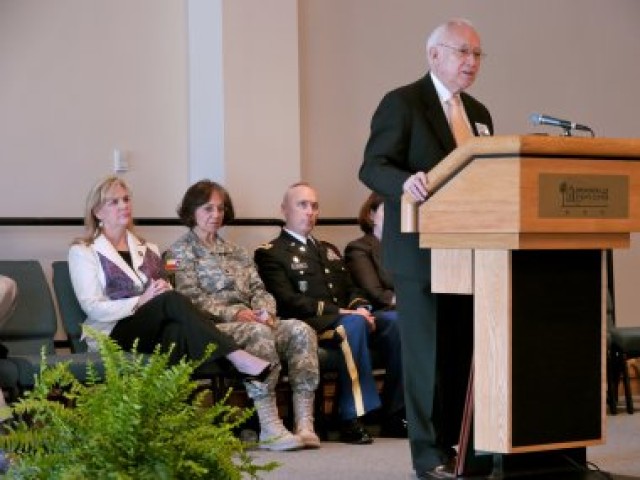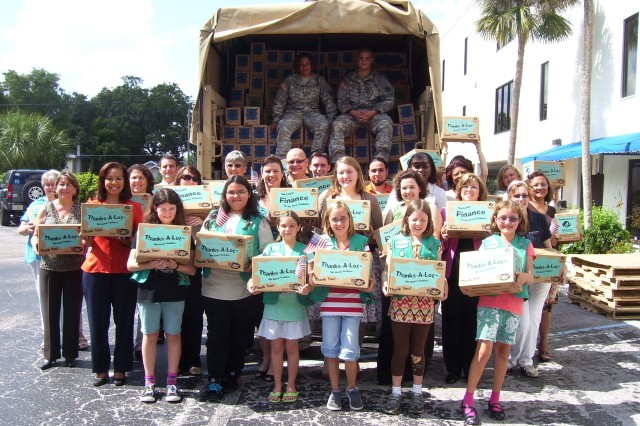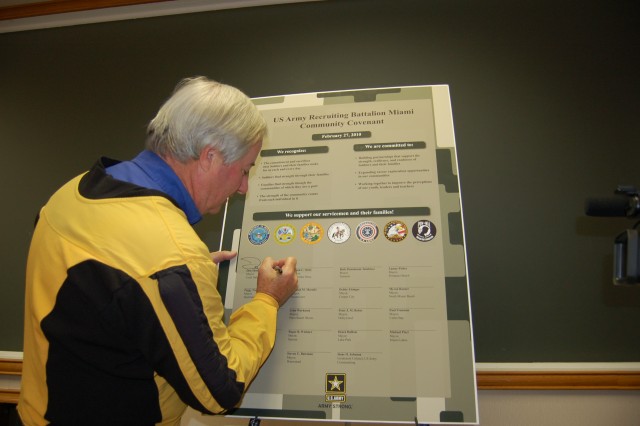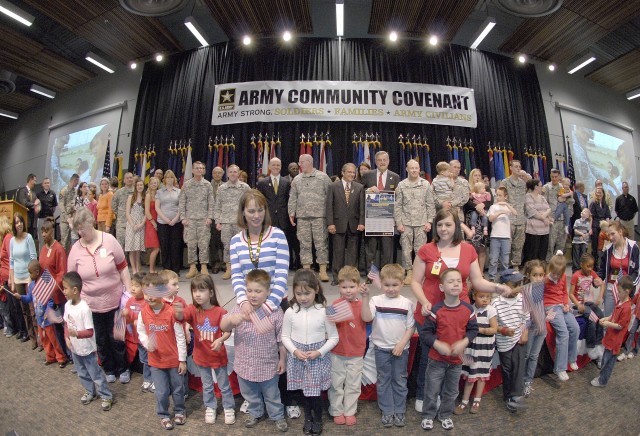ARLINGTON, Va. -- The Army Community Covenant commemorates its two-year anniversary this month with an appreciation and thanks for communities, organizations and Americans who continue to support Soldiers and their families.
The secretary of the Army created the Army Community Covenant in 2008 to foster and sustain effective state and community partnerships needed to improve the quality of life for those belonging to the service.
The program officially launched with the first Community Covenant signing ceremony April 17, 2008, in Columbus, Ga., between Fort Benning and its surrounding communities. Since then, more than 460 signing ceremonies have taken place in 48 states, three territories and the District of Columbia, as all pledged their assistance.
Indeed, Americans certainly recognize that Soldiers and families make considerable sacrifices as they defend the Nation, say Army leadership. Long deployments, frequent moves and separations are just a few of the unique stresses military families face daily.
Since the birth of the Army on June 14, 1775, communities, organizations and individuals have stepped forward to help mitigate stresses associated with military life. The Community Covenant highlights that support, while also striving to inspire Americans to continue to recognize and support the men and women in uniform. Community support is essential to the readiness of the Army; it contributes to the strength and resilience of U.S. Soldiers and families.
Lt. Gen. Rick Lynch, commanding general of Installation Management Command and assistant chief of staff for installation management, has oversight of the Community Covenant program for the secretary of the Army. Lynch signed a covenant with the Coastal Empire community in Georgia on July 11, 2008, including the seven counties and 10 cities surrounding nearby Fort Stewart and Hunter Army Airfield, when he was the commander of the 3rd Infantry Division. Lynch had just returned from his second tour in Iraq and was on his way to assume command of III Corps at Fort Hood, Texas.
The general understands what gratitude looks like. "The generosity of America's neighborhoods, towns, cities, and counties is astounding," Lynch said. "Every day communities devise new ways, both small and large, to demonstrate their appreciation for Soldiers and families."
Lynch also stressed the importance of community support. "As the Army reflects the face of America, the Army Community Covenant reflects the face of America's gratitude," he said. "It's all about relationships."
There are many ways Americans can express their appreciation to servicemembers. For example: Adopting a unit, which not only includes sending care packages to deployed Soldiers, but also supporting families left behind, is a great way to get involved. Such generosity breathes life into the Army Community Covenant. Plus it helps to provide Soldiers and their families a quality of life commensurate with their service.
In August 2009, a revamped Community Covenant website - www.army.mil/community - was launched to more easily identify programs by categories based on needs of Army families. The website also shares programs to help Americans support troops in meaningful ways. More than 100 national programs can be found, as well as more than 500 state and local programs, including grassroots efforts right outside the gates of Army installations. And a Facebook page was created to provide a feedback mechanism.
Another recent initiative highlighted through Community Covenant is called "Letter from Hollywood." This project was created by actor D.B. Sweeney, who is collecting open letters of support from celebrities. These letters express the gratitude of entertainers who understand the service of Soldiers and families.
"I'm extremely grateful for the sacrifices you and your families make every day to keep America safe," Sweeney wrote in a letter to the troops. "I've come across many other people in show business who also support you. (Who) quietly appreciate the admirable reasons you volunteered and the ideals you uphold. And that's what Letter From Hollywood is all about. Giving some of these folks a way to reach you."
The Community Covenant also acts as a platform to develop a comprehensive support framework of local and state agencies and community organizations to ensure all Soldiers and families have programs and services in their community.
This type of support framework is highlighted by the efforts of the Hispanic Active Relationships Project. On March 6, HARP, a faith-based organization in Brownsville, Texas, hosted a Covenant signing bringing together federal, state and local supporters, such as Congressman Solomon Ortiz.
Their efforts resulted in a collaborative network in Cameron County - including faith-based, police, education, government and non-profit organizations - to provide support to military members and their families in the lower Rio Grande Valley. By signing the Covenant, every attendee offered specific support in their own way. "It's all about bringing together the needs of the military families with what this wonderful, rich community that Cameron County is, can offer to support them," said Karen Anzak, associate director of HARP, following the signing ceremony.
Community support of our military and their families is also a priority for the Obama administration. First lady Michelle Obama visited the Pentagon April 9, to show her appreciation of servicemembers, their families and Department of Defense civilians.
While addressing hundreds of Pentagon employees, she said "As long as I'm first lady, I'm going to keep urging all Americans to do their part, whether it's something as simple as volunteering time or pro-bono services to troops and their families, or making a home-cooked meal for a busy spouse who's struggling to keep it together, ... or something as simple as saying thank you when you see one of our troops in your community."
As the Community Covenant heads into its third year, Army leadership say they thank every community, organization and citizen who has work hard to ensure military members and their families have a strong support network of friends, neighbors and communities. And they urge all Americans to do what they can to enhance that network.








Social Sharing